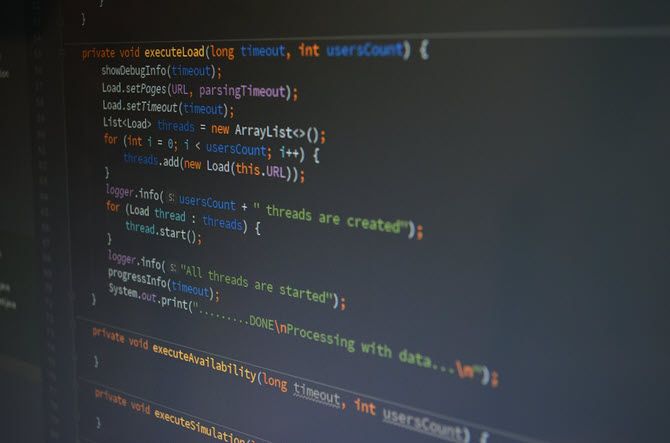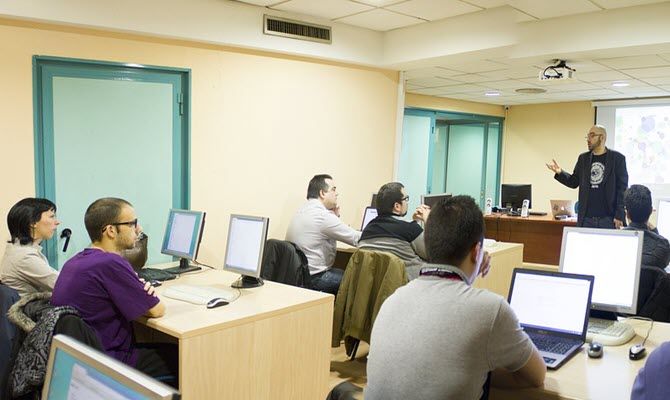
It’s student orientation, and you’re sitting at a table with a bunch of other students. You’re staring at a course catalog and trying to decide which classes to take next semester. You spot a few programming classes, and wonder if they’re right for you. Do you even need them with your major?
If you’re an Engineering or Computer Science major, the choice is made for you. Programming classes are usually a core part of the curriculum. But if you’re studying any number of other fields from biology or psychology to telecommunications or nursing, the choice isn’t so clear.
The answer is that the actual course to choose, and your reasons for choosing it, can vary from person to person.
Is Programming Scary? Yes… And No

If you’ve never done well in classes like math in high school, you may be wary about taking on a computer programming class.
You’ve probably heard upper-level students telling horror stories about a programming class they attempted to take, and failed miserably—or dropped out before the class could destroy their GPA.
There’s good reason to fear taking a programming class that’s too advanced for your level of computer knowledge. The students who tell these stories usually chose coding courses the wrong way.
To choose the right programming course, you should ask the following questions:
- Is it geared toward students with your level of computer knowledge?
- Does it teach a technology you might actually use in your career?
- Does the course description describe a skillset that could enhance your resume?
- Could the class give you a competitive advantage in your field of study?
These questions aren’t always easy to answer.
What a Programming Course Will Teach You

A nursing student may not know that when he enters the nursing field, he’ll need to use spreadsheet-based software for collecting patient information. Understanding how to automate spreadsheets using code could give him an advantage over other new nursing hires.
A biotechnology student may not know that when she goes to work for a large pharmaceutical company, she’ll end up having to crunch very large datasets, which she could automate using a simple Java application.
So, if you don’t already know what challenges await you in the industry you’ll be entering, how do you know what course to choose?
There are three ways:
- Find a mentor already working in the industry and ask what programming skills they’ve needed.
- Understand from the course description, the specific skills the course will teach you.
- Select the course that’s right for your current knowledge level.
First, let’s look at important skills you’ll learn from a programming class.
4 Important Skills Programming Will Teach You

Many people think that if you take a programming class, you’re going to be stuck sitting in a class with a bunch of computer geeks, listening to a professor use terms you’ve never heard before.
The reality is that every programming class is different.
In fact, introductory programming classes are nothing like that at all. Usually the professor starts from ground zero, teaching you everything you’ll need to know to succeed in the class. Once you’re done with the intro class, you’ll know all the lingo you need to know to take more advanced classes later on if you want to.
The following are most valuable skills you’ll learn from these classes.
1. Problem Solving
Planning to code involves drawing a flow diagram of the program logic. This process teaches you to think in terms of making decisions using logic like IF-THEN-ELSE or WHILE.
This process checks if something is true, then makes a decision based on those truths. Managing each “truth” in the decision logic will eventually achieve some end solution. This problem solving process works in many other fields outside of computer science.
It can help doctors analyze symptoms and make a diagnosis, for example.
2. Decision Making
Programming involves defining all of the variables that could influence some process. Then, you use those variables to perform calculations or make comparisons.
Understanding and defining all variables is an important part of any decision making process.
In the financial industry for example, defining all variables that influence changes in a company’s stock price can help you offer good investment advice.
3. Working Well With Others
An important part of programming is learning how to structure your code in a modular way that can be “plugged into” any other module of code and work properly.
Many programming classes have group project work where each person in the group writes their module of code.
Learning to collaborate with a group to define and solve smaller parts of a large problem is a very valuable skill to have when you enter the workforce.
4. How to Be Creative
A core part of defining the flow and logic of a program involves a lot of creativity.
You’ll need to design graphical user interfaces that are intuitive and aesthetically pleasing for users. You’ll also need to learn how to handle unexpected user responses.
This thought process builds empathy and outside-the-box thinking, as you put yourself in the shoes of the user and see the world through their eyes rather than your own.
Which Programming Courses Are Right for You?

As mentioned above, a great first step in making this decision is talking to a mentor who’s already working in the industry you’re hoping to enter. Find out what types of computer skills, software, or hardware are commonly used throughout the industry.
You should also try to find out what expertise employers need, but have difficulty hiring qualified people for.
Asking the following questions can help you choose the programming course that’ll give you a huge competitive advantage when you’re looking for a job in your field:
Are you terrified of computers?
There are programming courses available for every experience level. There’s nothing wrong with taking Introduction to Computers 101 if that’s your starting point. In fact, taking introductory courses often introduces you to an area of computing you absolutely love, and never would have known about otherwise. Don’t feel like you have to jump into advanced classes. If you know you’ll need to learn VBA for Excel automation as part of your business major, then start off with an introductory course and work your way toward more advanced Visual Basic courses each semester.
What are the core industry technologies?
If you’ve learned from your mentor that the medical industry is heavily invested in mobile database applications, then mobile-based data analytics classes may be ideal. If you learn that a lot of people in the digital media field are creating their own websites to build their porfolios, then taking an HTML or web design class might be exactly what you need. Don’t dive into programming blindly. Understand what programming skills will give you the most competitive advantage when you graduate and start job hunting.
Do you have new ideas for your industry?
You don’t have to do what everyone else is doing in your industry either. Often, speaking with your mentor, you may learn there are existing gaps. For example, the medical industry may be struggling with how to share patient information via the cloud, while respecting federal privacy regulations. The indusry may lack any viable solution. By exploring those technologies through the classes you take, you could very well become the person who solves that industry problem!
Tips for Your First Day of Programming Class
So, you’ve made the decision to dive in and start learning to code. You may be a little bit nervous about your decision. The following tips will help you prepare for your class and walk in on day one with confidence.
Learn to Google code: If you’re challenged with an assignment using a programming technique you’ve never used before, don’t be afraid to ask Google how other people have accomplished it. There are search results on nearly any programming issue you might come across. Usually the code samples you find won’t do exactly what you need, but they can help you understand the correct syntax, and how to correctly structure your code. It isn’t cheating, so long as you don’t use the exact code you’ve found on the internet. But it’s okay to learn from existing code examples!
Test drive coding first: There are lots of websites for learning to program online for free. Some examples include CodeAcademy, Coursera, or Udemy. Some universities even offer free courses as well. Working through one of these free courses will help you gauge whether or not you want to dive deeper by taking a full college course on the topic.
Don’t Give Up! Learning to Program Is Worth It
Learning a new programming language is a lot like learning any other language. It can appear overwhelming at first, but once you immerse yourself into the experience you may discover that you love programming after all.
Give the class time to grow on you, and take full advantage of lectures, assignments, and the professor’s office hours.
Once you’ve identified a programming skill that’s in demand in your industry, devoting time in a class to hone those programming skills will make you extremely valuable new hire when you’re job hunting.
And even if you never use it again, programming will teach you a new approach to problem solving and critical thinking that you may never have considered before. That’s always something worth investing in.
Image Credit: sevendeman/Depositphotos
Read the full article: Read This Before Signing Up for a Programming or Coding Course!
from MakeUseOf https://ift.tt/2sX2yEB
via IFTTT
0 comments:
Post a Comment